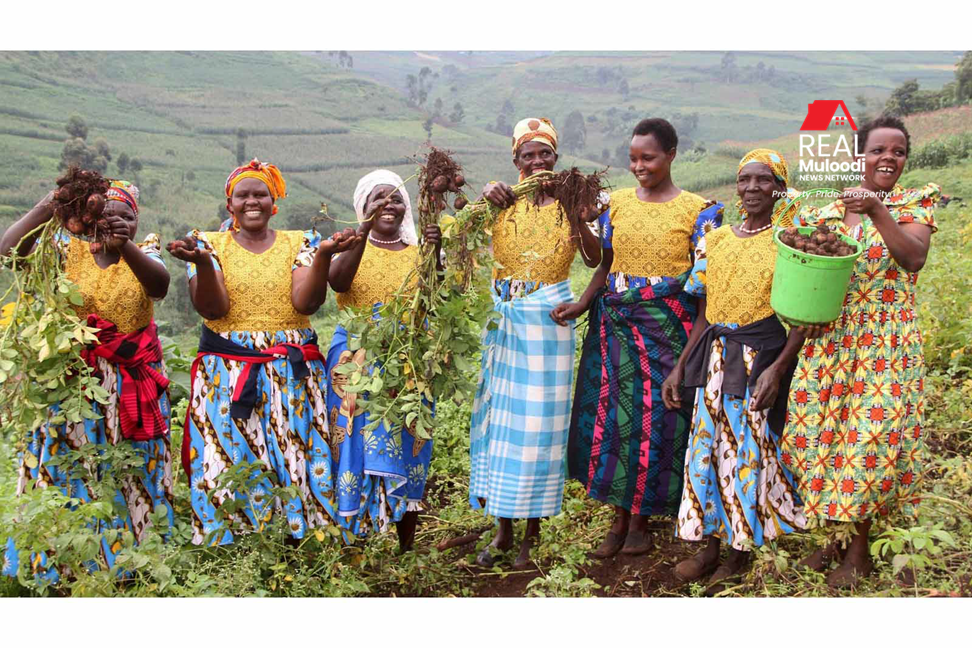UGANDA, Butaleja | Real Muloodi News | A group of women in Butaleja District, Uganda, are using customary titles to secure loans from banks and micro-finance institutions, enabling them to fight poverty and improve their livelihoods.
Jesca Nahyuha, a widow from Mirembe Village, Kachonga Parish in Mazimasa Sub-county, acquired a customary land title following her husband’s death.
“When my husband died, my in-laws started grabbing my land because they believe that when a man dies, a woman has no say on the land,” Nahyuha said. “I registered the land and got ownership. Since I got the titles, my life has changed.”
The Uganda Community-Based Association for Women and Children Welfare (UCOBAC) has assisted Nahyuha and other women in obtaining customary land titles.
Stella Namugombe, a resident of Naweyo Sub County, used her title to secure a loan for her business in Nabiganda Town Council.
“Before starting this business, I was struggling. Now, I’m earning a steady income with my small business,” Namugombe said.
Amina Miya from Kachonga Village, Naweyo Sub-county, used her customary title to resolve disputes with neighbours and secure a loan for her business.
“Since I registered my land, the wrangles were solved and I also used the titles to get a loan for business,” Miya said.
Aidah Mugoya, the district Secretary for Gender, highlighted the positive impact of land registration on household incomes.
“We encourage people to get loans using these titles to improve their livelihood. This project has educated women and children on their rights to own land,” Mugoya stated.
Samuel Tawonda, the Kachonga Village chairperson, confirmed a reduction in land conflicts due to the land registration initiative.
“Previously, the cases of men selling land and mistreatment against women and children in the district were on the increase,” Tawonda said.
In Uganda, women’s rights to land and property are often denied, leaving many dependent on men and vulnerable to violence, poverty, and food insecurity, especially if they are widowed, divorced, single, or cohabiting.
Frances Birungi, the executive director of UCOBAC, noted that during the demarcation and mapping process, 19 out of 20 land disputes have been resolved.
The project is a collaboration between the government, UN-Habitat, and the Global Land Tools Network (GLTN), supported by the Netherlands Enterprise and Development Agency (RVO).
The UN-Habitat for Humanity, a GLTN-funded program, aims to ensure tenure security for vulnerable groups using fit-for-purpose tools.
Hebert Himigu, the deputy chief administrative officer (CAO), noted that 80 per cent of Butaleja’s land falls under customary ownership, yet many landholders lack proper documentation.
“It has also helped special interest groups such as People with Disabilities (PWDs), women, and children to get rights on land,” Himigu said.
Butaleja District Chairperson Micheal Higenyi identified high population density as a significant factor contributing to land disputes.
“The population explosion remains the biggest factor that has partly engineered land conflicts,” Higenyi stated.
Butaleja Deputy Resident District Commissioner Adonia Mafumo praised the land registration initiative for improving land rights and livelihoods across the district.
Richard Asiimwe, the lands administration officer at the Ministry of Lands zonal office, informed visiting global land governance experts that customary land certificates can serve as collateral for loans, demonstrating ownership and adding value to the land.
“The certificates could be used as collateral in banks to acquire loans because these customary certificates could prove ownership,” Asiimwe explained.
Under Section 8 (7) of Ugandan law, a Certificate of Customary Ownership is recognised by financial institutions as valid for purposes of evidence.
A report released in March, titled “Justice Needs and Satisfaction in Uganda 2024,” shows that land wrangles form a significant part of the daily legal needs of Ugandans, with 42 per cent of people involved in land disputes.
READ MORE LIKE THIS:



